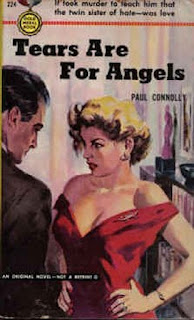Paul Connolly’s Tears Are for Angels is a noir fiction title published in 1952 by Gold Medal.
Paul Connolly was actually Thomas Wicker (1926-2011), who had a fairly distinguished career as a journalist. Tears Are for Angels is one of three pulp novels he wrote in the early 50s.
Harry London (who narrates the story) is doing what he always does, sitting outside his one-room shack, as drunk as a skunk, shooting at cans. He hasn’t washed or shaved for weeks. He seems like a typical derelict. But two years ago Harry London was the biggest land owner in Coshacken County, a scion of the county’s most distinguished family. That was before, when Lucy was still alive.
That’s when the girl shows up. Her name is Jean. She asks a lot of questions. She seems to know something about Lucy. But how much does she know? Maybe Stewart sent her. Maybe Stewart is getting tired of waiting. It’s hard for a man to wait two years for something, not knowing exactly what it is he’s waiting for. Stewart could be getting edgy by now. But Harry decides that Jean is telling the truth when she says she doesn’t know Stewart. The fact remains that this girl knows something about what happened two years ago. Maybe Harry will just have to tell her, to explain how it was. The girl knows that it wasn’t the way the papers said it was, that night two years ago that left Harry with one arm and left Lucy dead. So Harry decides to tell her.
Two years ago Harry was happily married, to Lucy. Until that night he came home early. After what he saw in the bedroom that night Harry’s life more or less came to an end. Harry can still see their naked bodies clutched together in passion. Lucy died that night, but not the way the papers said she died. Harry knows how she died, and so does Stewart. It’s not finished, but one day Harry intends to finish it.
Jean isn’t sure at first whether to believe Harry. She has her own tale to tell about Lucy. Maybe the two stories together make sense of the events of that night, but maybe there are things that neither Harry nor Jean know. Jean starts to believe Harry’s story, but she hates him. He slaps her around a little and tries to rape her, but that’s not why she hates him. He hates her as well, but slowly he figures something out. She’s broken inside, just like he is. Maybe there’s a way they can put their broken lives together. A plan starts to form in their minds. It’s not a very nice plan but it is clever and maybe they don’t have a choice.
The plan goes like clockwork, at first. It doesn’t exactly bring them together. They still hate each other. But that doesn’t stop the frantic need they have for each other’s bodies. Hate can inflame lust just as love can. For these two there may not be much difference between love and hate.
Then the plot twists start to kick in, and they’re not the plot twists that you expect. This is not just a routine noir tale. It’s definitely a noir tale - there’s love and hate and betrayal and sexual obsession and other kinds of obsession and it’s all leading towards murder. But it’s not a straightforward story of obsession leading to murder. Harry starts to analyse things. He starts to question his obsession and the reasons for it and he starts to question his feelings for Jean.
The plot is very clever and very satisfying but this a story that is both plot and character driven. The bizarre sexual and emotional entanglement between Harry and Jean is a major focus. Perhaps they’re not, on the surface, very attractive people but there are reasons for their behaviour and the reader will slowly develop a considerable sympathy for both of them. They’re lost and they’re trapped. That’s pretty normal for characters in noir fiction. But in this case the author is suggesting that even the most damaged men and women may have some hope, insofar as anyone in a noir fiction story has hope. Harry and Jean do at least start to understand themselves and each other but whether the understanding will come in time to save them is something you’ll have to read the book to find out.
This is definitely above-average noir fiction, both in terms of emotional complexity and stylistically. It’s also very honest about sex, and the author really does make an attempt to understand female sexuality and female emotions.
Excellent stuff. Very highly recommended.

No comments:
Post a Comment